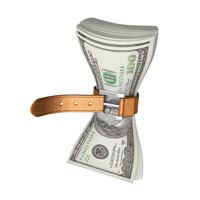Auto Insurance in Chicago – 10 Ways to Save Money

Finding lower rates for Chicago auto insurance can be nearly impossible for people who are new to buying insurance online. People have so many companies to choose from that it can easily become more work than you anticipated to compare prices in Chicago.
It’s a great practice to shop coverage around once or twice a year due to the fact that insurance rates are rarely the same from one policy term to another. Just because you found the lowest rates a few years ago you can probably find a lower rate today. Starting right now, ignore everything you know about auto insurance because you’re going to learn the quickest way to properly buy coverages and cut your premium.
How much can you save with these ten discounts?
Auto insurance companies don’t always advertise all their discounts in a way that’s easy to find, so we break down both well-publicized and the harder-to-find discounts you could be receiving. If you aren’t receiving every discount you qualify for, you are paying more than you should be.
- Discount for New Cars – Buying coverage on a new vehicle can be considerably cheaper since new cars are generally safer.
- Government Employees – Being employed by or retired from a federal job can earn a discount up to 10% with certain companies.
- Accident Waiver – A few companies will forgive one accident before your rates go up as long as you don’t have any claims for a particular time prior to the accident.
- Safe Drivers – Drivers who avoid accidents can pay as much as 50% less than drivers with accident claims.
- 55 and Retired – Mature drivers may be able to get a discount up to 10%.
- Anti-lock Brake Discount – Vehicles with anti-lock braking systems prevent accidents and will save you 10% or more.
- Early Switch Discount – A few companies offer discounts for signing up before your current expiration date. It’s a savings of about 10%.
- Pay Now and Pay Less – If you pay your bill all at once instead of monthly or quarterly installments you can actually save on your bill.
- Student in College – Children who attend school more than 100 miles from home and don’t have a car may qualify for this discount.
- Multi-policy Discount – When you have multiple policies with one insurance company you may save up to 20% off your total premium.
Drivers should understand that most credits do not apply to the overall cost of the policy. Some only reduce individual premiums such as comprehensive or collision. So when the math indicates it’s possible to get free car insurance, companies wouldn’t make money that way.
To choose insurers with discount auto insurance rates in Illinois, follow this link.
Finding Auto Insurance in Chicago, Illinois
Cutting your Chicago auto insurance rates doesn’t have to be difficult. You just need to invest a few minutes comparing price quotes from different insurance companies. This can be accomplished in several different ways.
- The most efficient way to get quotes for comparison is an all-inclusive rate comparison (click to open form in new window). This type of form keeps you from doing repetitive form submissions for each company. In just a few minutes this one form will return quotes instantly. This is perfect if you don’t have a lot of time.
- A more time consuming way to find lower rates requires a trip to the website for each individual company and fill out their own quote form. For example, let’s assume you want comparison quotes from Nationwide, Allstate and Travelers. To get rate quotes you would need to go to every website to input your insurance information, which is why the first method is quicker.For a handy list of car insurance company links in Chicago, click here.
- The hardest way to get comparison rates is to spend your day driving to and from local Chicago insurance agencies. Buying insurance online eliminates the need for an insurance agent unless you prefer the professional advice only provided by licensed Chicago agents. However, consumers can comparison shop online and get advice from an agent in your area.
It’s up to you how you get prices quotes, just make absolute certain that you use identical deductibles and coverage limits for every quote you compare. If you have unequal deductibles or liability limits then you won’t be able to decipher which company has the cheapest Chicago car insurance quotes.
Auto insurance coverage information
Having a good grasp of your auto insurance policy can help you determine the right coverages and the correct deductibles and limits. Policy terminology can be confusing and nobody wants to actually read their policy.
Liability
Liability coverage provides protection from damage or injury you incur to other’s property or people in an accident. It protects YOU from claims by other people, and does not provide coverage for damage to your own property or vehicle.
It consists of three limits, bodily injury per person, bodily injury per accident and property damage. You commonly see policy limits of 50/100/50 that means you have a $50,000 limit per person for injuries, a limit of $100,000 in injury protection per accident, and a limit of $50,000 paid for damaged property.
Liability coverage pays for claims like medical expenses, bail bonds and funeral expenses. How much liability coverage do you need? That is a decision to put some thought into, but consider buying higher limits if possible. Illinois requires minimum liability limits of 20,000/40,000/15,000 but you should consider buying better liability coverage.
Collision insurance
Collision insurance covers damage to your vehicle resulting from a collision with an object or car. You first must pay a deductible then your collision coverage will kick in.
Collision insurance covers claims like backing into a parked car, crashing into a building and scraping a guard rail. Paying for collision coverage can be pricey, so analyze the benefit of dropping coverage from vehicles that are 8 years or older. You can also choose a higher deductible in order to get cheaper collision rates.
Coverage for medical payments
Coverage for medical payments and/or PIP provide coverage for bills for surgery, EMT expenses, hospital visits, dental work and rehabilitation expenses. They are used to cover expenses not covered by your health insurance policy or if you lack health insurance entirely. Coverage applies to both the driver and occupants and will also cover getting struck while a pedestrian. PIP is only offered in select states but it provides additional coverages not offered by medical payments coverage
Comprehensive coverages
This covers damage that is not covered by collision coverage. You first have to pay a deductible then your comprehensive coverage will pay.
Comprehensive coverage protects against claims such as damage from a tornado or hurricane, hitting a deer, rock chips in glass and falling objects. The highest amount a auto insurance company will pay at claim time is the market value of your vehicle, so if the vehicle is not worth much consider removing comprehensive coverage.
Uninsured and underinsured coverage
This coverage provides protection from other motorists when they either have no liability insurance or not enough. It can pay for hospital bills for your injuries and also any damage incurred to your vehicle.
Since many Illinois drivers carry very low liability coverage limits (Illinois limits are 20/40/15), it only takes a small accident to exceed their coverage. This is the reason having UM/UIM coverage should not be overlooked.
Online plus local equals savings
When buying insurance coverage, make sure you don’t buy lower coverage limits just to save a few bucks. There are many occasions where drivers have reduced liability limits or collision coverage only to regret that their decision to reduce coverage ended up costing them more. Your strategy should be to purchase plenty of coverage at a price you can afford, not the least amount of coverage.
We’ve covered some good ideas how to save on auto insurance. The key thing to remember is the more rate quotes you have, the higher the chance of saving money. You may even find the biggest savings come from an unexpected company.
Affordable auto insurance is available from both online companies as well as from independent agents in Chicago, so compare prices from both to have the best selection. Some insurance companies don’t offer the ability to get a quote online and many times these small insurance companies only sell through independent insurance agents.

